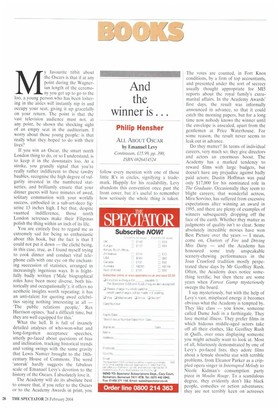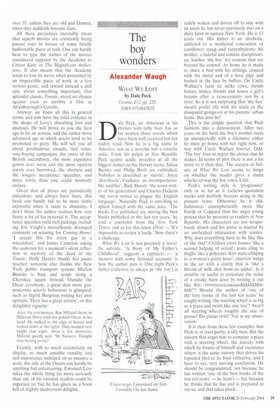And the winner . . .
Philip Hensher
ALL ABOUT OSCAR by Emanuel Levy Continuum, £15.99, pp. 390, ISBN 0826414524 My favourite titbit about the Oscars is that if at any point during the Wagnerian length of the ceremony you get up to go to the loo, a young person who has been loitering in the aisles will instantly nip in and occupy your seat, giving it up gracefully on your return. The point is that the vast television audience must not, at any point, be shown the shocking sight of an empty seat in the auditorium. I worry about those young people: is that really what they hoped to do with their lives?
If you win an Oscar, the smart north London thing to do, or so I understand, is to keep it in the downstairs loo. At a stroke, you grandly signal that you're really rather indifferent to these tawdry baubles, recognise the high degree of vulgarity invested in the numbered statuettes. and brilliantly ensure that your dinner guests will have minutes of awed, solitary communion with your worldly success, embodied in a sub-art-deco figurine 13 inches high. I bet that, despite vaunted indifference, those north London actresses make their Filipinas polish the thing within an inch of its life.
You are entirely free to regard me as extremely sad for being so enthusiastic about this book, but the fact is that I could not put it down — the cliché being, in this case, true. as I found myself trying to cook dinner and conduct vital telephone calls with one eye on the enchanting succession of statistics, arranged in increasingly ingenious ways. It is frightfully badly written (Wale biographical roles have been more diverse, both historically and occupationally'); it offers no aesthetic insights worth repeating; it has an anti-talent for quoting awed celebrities saying nothing interesting at all — The public relations people,' Rex Harrison opines, 'had a difficult time, but they are well equipped for this.'
What the hell. It is full of insanely detailed analyses of who-won-what and
long-forgotten acceptance speeches, utterly po-faced about questions of bias and inclination, tracking historical trends and voting swings with the same gravity that Lewis Namier brought to the 18thcentury House of Commons. The word 'anorak' hardly suggests the fabulous scale of Emanuel Levy's devotion to the history of the Oscars. I absolutely love it.
The Academy will do its absolute best to ensure that, if you refer to the Oscars or to the Academy Awards in print, you follow every mention with one of those little R's in circles, signifying a trademark. Happily for his readability, Levy abandons this convention once past the front cover, but it's useful to remember how seriously the whole thing is taken.
The votes are counted, in Fort Knox conditions, by a firm of top accountants, and presented under the sort of secrecy usually thought appropriate for MI5 reports about the royal family's extramarital affairs. In the Academy Awards' first days, the result was informally announced in advance, so that it could catch the morning papers, but for a long time now nobody knows the winner until the envelope is unsealed, apart from the gentlemen at Price Waterhouse. For some reason, the result never seems to leak out in advance.
Do they matter? In terms of individual careers, very much so; they give directors and actors an enormous boost. The Academy has a marked tendency to reward films with large budgets, but doesn't have any prejudice against badly paid actors; Dustin Hoffman was paid only $17,000 for his nominated role in The Graduate. Occasionally they seem to blight careers; that wonderful actress, Mira Sorvino, has suffered from excessive expectations after winning an award in 1995, and there are plenty of examples of winners subsequently dropping off the face of the earth. Whether they matter as judgments of quality isn't so clear. Some absolutely incredible movies have won Best Picture over the years — I mean, come on, Chariots of Fire and Driving Miss Daisy — and the Academy has honoured some truly unspeakable scenery-chewing performances in the Joan Crawford tradition mostly perpetrated these days by Mr Geoffrey Rush. Often, the Academy does notice something terrific; but then there are some years when Forrest Gump mysteriously sweeps the board.
I say mysteriously, but with the help of Levy's vast, misplaced energy it becomes obvious what the Academy is tempted by. They like class — you know, someone called Dame Judi in a farthingale. They love mental illness. They prefer films in which hideous middle-aged actors take off all their clothes, like Geoffrey Rush in Quills, over ones displaying someone you might actually want to look at. Most of all, hilariously demonstrated by one of Levy's po-faced lists, they adore films about a female showbiz star with terrible problems, from Eleanor Parker as a crippled opera singer in Interrupted Melody to Nicole Kidman's consumption party piece in Moulin Rouge. To a scandalous degree, they evidently don't like black people, comedies or action adventures; they are not terribly keen on actresses over 35, unless they are old and Darned, when they suddenly become class.
All these prejudices inevitably mean that superb movies are constantly being passed over in favour of some briefly fashionable piece of tosh. One can hardly bear to type the names of the movies considered superior by the Academy to Citizen Kane or The Magnificent Ambersons. It also means that the Academy tends to lose its nerve when presented by an impeccable piece of work in a less serious genre, and reward instead a dull epic about something important; that splendid classic. Tootsie, stood no chance against even so terrible a film as Attenborough's Gandhi.
Anyway, we knew all this in general terms, and now have the solid evidence in the shape of Levy's absorbing lists and analyses. He will prove to you the best age to be an actress, and the rather more advanced age at which actors tend to be promoted to glory. He will tell you all about posthumous awards, tied votes, vote-buying campaigns, the years of the British ascendancy, the most expensive gowns ever worn and the most opulent jewels ever borrowed, the shortest and the longest acceptance speeches, and more trivia than you could normally endure.
Given that all prizes are periodically ridiculous, and always have been, this book can hardly fail to be most richly enjoyable when it turns to absurdity. I don't think the author realises how very funny a lot of his material is. The acceptance speeches yield rich pickings, including Jon Voight's marvellously deranged comment on winning for Coming Home: 'I accept this for every guy in a wheelchair,' and James Cameron asking the audience for a moment's silent reflection in memory of the dead of the Titanic. Holly Hunter thanks her piano teacher; someone else thanks the New York public transport system; Marlon Brando is busy and sends along a Cherokee squaw instead. Outside the Oscar ceremony, a great deal more preposterous actorly behaviour is glimpsed, such as Ingrid Bergman writing her own epitaph, 'Here lies a great actress', or this delightful vignette:
After the ceremonies, Ray Milland drove to Hillerest Drive with the golden Oscar in his hand. Ho walked to the edge of Sunset and looked down at the tights. They seemed very bright that night. After a few moments, Milland quietly said, 'Mr Navarro. Tonight they belong to me!'
Frankly, with so much eccentricity on display, so much amiable venality and self-importance indulged on so massive a scale, the tale of the Oscars can hardly be anything but entertaining. Emanuel Levy takes the whole thing far more seriously than any of his rational readers could be expected to, but he has given us a book full of slightly inadvertent delights.



























































 Previous page
Previous page